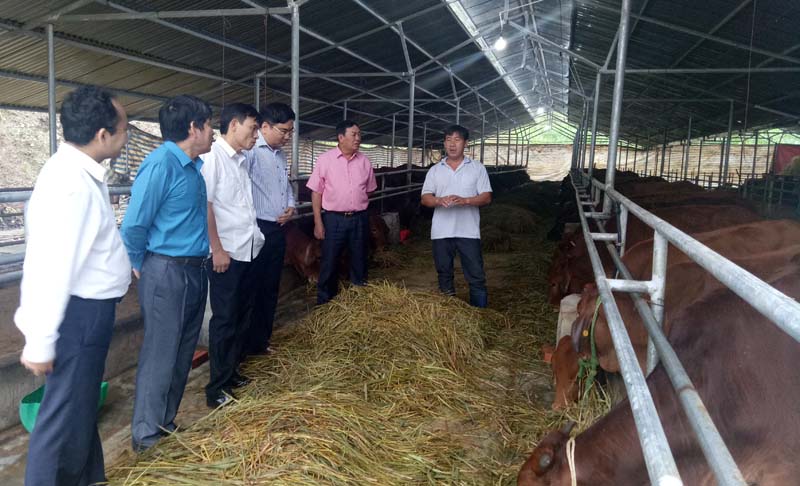
(HBO) – The Hoa Binh provincial People’s Committee has held a meeting to verify Hoa Binh city’s new-style rural area status. Vice Chairman of the committee Nguyen Van Dung chaired the event.
The province’s verification team examines the cow farming
model of the agricultural services cooperative of Dan Chu commune, Hoa Binh
city.
By October 3, all the seven communes of Hoa Binh
city had been recognised as new-style rural areas.
Over the last eight years, authorities and
agencies at all levels have mobilised resources and effectively integrated
capital sources to upgrade local infrastructure, thus giving a facelift to
rural areas. They have also moved to restructure agriculture so as to boost
mass production, form concentrated production zones, and apply scientific and
technological advances to improve product quality and value.
To raise residents’ income, the communes have
built production development projects basing on local potential and advantages
to gradually form specialised farming zones, promote specialties and create
products typical for them. These projects include farming cows, fish,
vegetables, lingzhi mushroom, guava and longan.
Hoa Binh city houses one industrial park on the left
bank of the Da River and two industrial clusters which have employed a number
of locals, thus raising the rate of people with jobs in the seven communes to
95.7 percent. The rate of trained labourers is 40.06 percent.
Average per capita income in rural areas has
risen from 15.8 million VND (676.5 USD) in 2011 to 38.84 million VND (nearly
1,700 USD) in 2017. The multidimensional household poverty rate has fallen to
1.31 percent in the city.
About 90.3 percent of the seven communes’
population has been covered by health insurance, while 98.5 percent of local
families have accessed clean water. Hoa Binh city has also ensured security and
order and does not have debt in basic construction projects./.
Dao Village’s honey – a product certified with a 3-star OCOP (One Commune One Product) rating by Thong Nhat Agricultural Cooperative in Dao Village (Hoa Binh City) – is highly regarded by consumers for its quality, richness, and variety in packaging. The distinctively sweet taste of Dao Village’s honey leaves a lasting impression on anyone who has tried it.
In alignment with Project No. 07-DA/TU, issued by the Hoa Binh provincial Party Committee on November 1, 2021, Lac Thuy district has actively promoted investment and supported the sustainable development of its industrial and handicraft sectors during the 2021–2025 period. Alongside this, the district has remained committed to preserving and revitalising traditional craft villages.
Located in the northern part of Lac Thuy district, with a temperate climate and fertile soil, Phu Thanh commune has great potential and advantages in growing tea. The long-standing experience, combined with strict adherence to organic farming practices in the tea gardens, ensures that the dried tea products from Phu Thanh and Lac Thuy as a whole are sold out immediately upon production, providing a stable and prosperous life for the local people.
Amid efforts to streamline the administrative apparatus, Hoa Binh province has intensified measures to address challenges in land clearance, resettlement support, and infrastructure investment, aiming to speed up the progress of key projects.
Hoa Binh province has posted an unprecedented economic growth rate of 12.76% in the first quarter of 2025, marking its highest quarterly performance to date and positioning it as the second fastest-growing locality in the country, trailing only Bac Giang province.
Under current regulations, products in the One Commune – One Product (OCOP) programme that are rated three stars or higher must undergo re-evaluation every three months. However, in reality, some of these products fail to consistently meet the required standards, raising concerns about the sustainability of their OCOP certification. This underscores the urgent need for producers to enhance product quality and gradually develop their OCOP products into strong, marketable brands.



